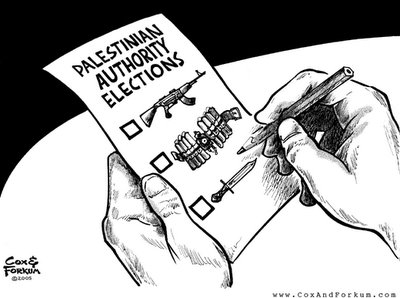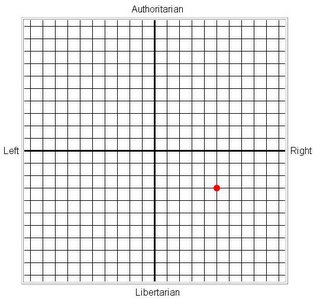This is very disturbing (via
LGF and
Ynet):
!UPDATE: see end of post!The renowned
World Economic Forum (WEF) is having its anual meeting at this very moment in the beautiful Alps in
Davos, Switzerland (I was even supposed to go there myself with the army for three weeks in order to help protecting it. I was exempted from duty to go since I am currently studying abroad). Among others, there's
Bill Clinton and
Angela Merkel speaking; the idea is to bring world leaders of politics and economy together (there's also some show-biz people).
Well it appears now that the
WEF's official magazine contains some of the crudest and most biased anti-"zionist" material. The booklet, titled “
Global Agenda,” bears the logo of the World Economic Forum and includes an introduction written by the conference organizers. It appears to be an official publication of the World Economic Forum and is included in every file handed out to conference participants. It is also distributed at the Zurich Airport and at Swiss hotels. The author of the harsh paper is
Mazin Qumsiyeh (excerpts):
Boycott Israel
(...) Zionists have been skilled at evolving their methods [ We have been knowing this since the "Protocols", but thanks for reminding it...! -ed.] over the years. There have been three important shifts in strategy since the movement began in the late 19th century. The first was a change in patronage. The shift from British to American protection was most noticeable between the 1930s and the 1960s. [ Which is a blunt lie, the U.S. started to get intersted in Israel since the Six Day war in 1967 beacause of growing Russian influence in the Arab world; do you think the Kalashinkovs and the tanks the Arabs use are all self-made? -ed.] The second was the acceptance of Fatah and the Palestinian Liberation Organization as groups to negotiate with on establishing autonomy for Palestine in the truncated areas of the West Bank and Gaza. The third strategic shift was the idea of a Palestinian statelet comprised of the disconnected ghettos of the West Bank and Gaza, occupied by Israel in 1967, à la South African Bantustans [ I was not aware that the "Bantustans" had attacked South Africa several times... -ed.]. These ghettos represent about a fifth of historical Palestine [the biggest part of "historical Palestine" calls itself nowadays "Jordan", just a detail of history -ed.].
Yet, despite these strategic shifts, today’s Zionist programme is unwavering in its original goals, which are shared by all major factions in Israeli politics – Likud, Labour, Shas and other religious parties. Its consensual programme includes the rejection of complete withdrawal from all areas illegally occupied [yes "illegal", have a look here -ed.] in 1967; the rejection of refugees’ right to return to their homes and lands; the rejection of concepts of full sovereignty or self-determination for Palestinians; and a refusal to change Israel’s basic laws, which discriminate against non-Jews [Oh, the Palestinians never rejected anything in 1937, 1948 and 2000? -ed.].
Unchanging goal
Thus, while tactics may change, the goals of political Zionism are unchanging: demand for Jewish Zionist control and maximum land with minimum Palestinians [ I thought they just wanted to live unharmed behind defendable borders. History has tought them how imprtant this is. -ed.]. Between 1947 and 1949, this was accomplished by outright removal of 70% of the Palestinian natives from the area that was to become Israel by 1949. More than 530 Palestinian villages and towns were completely depopulated and erased from the face of the new Israeli map. Even Israeli Zionist historians like Benny Morris now acknowledge this [ Mazin, why don't you ask Benny Morris, what he really thinks of Arafat's refusal in 2000? Because you know his answer, right? -ed.].
According to most historians and declassified material, Israel initiated the 1967 war to acquire more land, some of it for bargaining purposes and some for strategic and economic reasons [ Right, and Auschwitz is some Zionist invention, isn't it? -ed.].
Immediately, a new phase of colonization was started in the occupied areas of the West Bank, including East Jerusalem. A total of 450,000 colonial settlers have moved into these areas over the past 39 years. While 2% has been withdrawn from Gaza over the past year, an additional 4% has been added in other areas. (...)
Israeli apartheid
(...)
The relentless efforts of many to defend apartheid and separation can only be described as symptoms of cognitive dissonance at best and racism at worst. In their Orwellian world, occupation becomes “security”, a relentless war of colonization and occupation becomes “advancing democracy”, an apartheid wall becomes a “security fence”, being anti- or post-Zionist is morphed into being anti-Jewish, and “moderation” becomes a code word for shredding international law and basic human rights [ Ahmadinejad recently just spoke at some "Anti-Zionist" congress right? He was just concerned about basic humanitarian issues, right? -ed.].
Our demands
In July 2005, more than 170 Palestinian civil society organizations issued a historic document. It articulated Israel’s persistent violations of international and humanitarian laws and conventions and called upon “international civil society organizations and people of conscience all over the world to impose broad boycotts and implement divestment initiatives against Israel similar to those applied to South Africa in the apartheid era”.(...)
The author calls Israel an Apartheid state, is telling blunt lies about the "occuptaion", he doesn't lose a sole word of Arab aggression wars against the jewish state, worse: he rewrites history, the
T-word* is of course totally absent in that paper and the paper finally calls for a boycott of Israel. I wonder why the author doesn't call for a boycott of other states, whose balance sheet concerning the respect of human rights is much worse? Has the author ever called for a boycott of
Egyptian tourism facilities, of
Iraqi oil at Saddam's time, of
Iranian caviar, of
Palestinian keffiehs sold in Europe, of
Russian gaz, of
Chinese restaurants? All those "states" (there's no such thing as a Palestinian "state") are much worse than Israel ever was - in every regard. But anyway he goes on:
Kauft nicht bei Juden!Israel is certainly the only "Apartheid state" to grant
efficient access to its Supreme Court to the "oppressed" minority or to allow this minority to enjoy the much better medical treatement in its hospitals than the minority provides itself... However, in South Africa or in Mississippi in the old days, black people did not have full citizenship allowing them to vote or to be represented in politics. Guess what? Israeli Arabs do. The author of this paper then calls for a right of return of the "refugees". He's of course not speaking of the hundreds of thousands of Jewish refugees who had to flee and who were lucky enough to be able to leave their homes in Morocco or Iraq
alive. He wants Arab "refugees" to get to Israel. He knows perfectly well that this issue has been kept alive by Arab leaders since 1948 with the
sole purpose to exert pressure on Israel and the public opinion. Where else in the world are there "refugee camps" existing during decades? Any "return" would be the immediate end of Israel. The author knows this and that is why the Arabs claim it.
However, the author of the above paper is amassing such an amount of blunt lies, of standard disinformation and of antisemitic speech that you would believe it is "business as usual" in some average Arab newspaper. I am very upset though to realize that
this is in the official magazine of a well-known and very respected event that takes place every year in Switzerland and which is appreciated by some of the most important people around. The magnificent Swiss Army™ even protects it...! Not only am I convinced that this a breach of Swiss penal law (an antiracist provision which is usually only invoked by leftits, but in no way when it is about defending Israel's rights) - but I also regard this as an insult to what Switzerland is supposed to represent.
The WEF is co-responsible for this disinformation and the antisemitic statements that are being diffused in its name.This is of course a case where the Swiss media would have to play their role. Will they pass this test? This would mean to clearly express themselves in favor of Israel and against Arab disinformation and propaganda... I am not confident.
*Terrorism, that is the word Arab commentators and their MSM apologists usually refer to as "legitimate resistance"UPDATE (26.01.2006, 15:30): The Founder and Executive Chairman of the WEF
apologizes for the above mentionned article:
Statement from Professor Klaus Schwab on Global Agenda Magazine
26 January 2006 - Davos, Switzerland
With great concern and pain, I just learned that Global Agenda,a publication distributed to our members at the Annual Meeting 2006, contains an article calling for a boycott of Israel. This article is totally in contradiction to my own, and the Forum’s, mission and values. For 36 years I have been committed to fighting for mutual understanding in the world. The Forum has been deeply involved in the efforts to create better relations and reconciliation in the Middle East and throughout the world.
As soon as I learned about this article, I immediately investigated how this situation could have developed. I concluded there was an unacceptable failure in the editorial process, specifically an insufficiently short period for review of content – for which there is no excuse. I, on behalf of the Forum, profoundly apologize and express my regrets to everyone.
I can assure you that appropriate steps have been instituted to ensure that this will never happen again.
I would like to confirm to all our friends in the Middle East, and throughout the world, that the Forum will continue, under my leadership, to do everything possible to foster dialogue and open communication among all parties, based on mutual respect and recognition, and not on confrontation.
Klaus Schwab
Founder and Executive Chairman
World Economic Forum
There's more on this over at
bloodthirstyliberal, who reminds us that "
you can’t hold an international conference these days without a good Jew-bashing." This is is of course a entirely justified reference to the shameful
Durban UN conference "against racism".
Bloodthirstyliberal provides us with a
link as well on
Mazin Qumsiye's general thoughts and credibility.
The article has been pulled off the WEF Magazine's site. Fortunately and thanks to Yours truly, it is still available
here (in
.pdf).











































<< Home